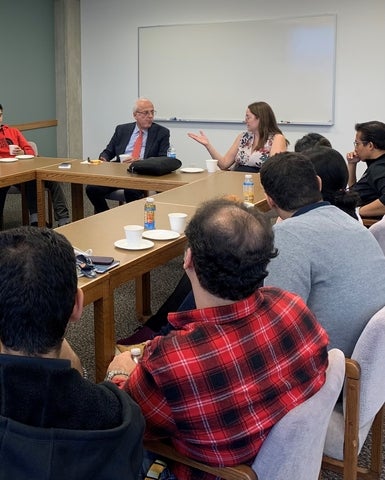Creating liquid fuel from renewable feedstock
In October, the Department of Chemical Engineering hosted a seminar presented by Professor Greg Stephanopoulos, a pioneer in the field of metabolic engineering.
His seminar titled, “Can biotechnology deliver cost-effective liquid fuels from renewable feedstocks?” focused on his groundbreaking research in engineering microbes for sustainable biofuel reproduction.
Society relies on liquid fuels for transportation, especially in the aviation, trucking, and shipping industries. Stephanopoulos’ research provides alternatives to using fossil fuels. This is important as no viable technology exists for the near future that does not utilize liquid fuels.
He has designed a biological method which fixes CO2 with hydrogen and converts the product of CO2 fixation to oil, which then can be used as biofuel or converted to green diesel. Stephanopoulos proposes that on a global scale converting CO2 from bioethanol plants could generate two to four billion gallons of biodiesel a year which could be converted to fuel, resulting in a reduction of CO2 emissions.
“Professor Gregory Stephanopoulos is one of the founding researchers of the field of metabolic engineering, the use of cell factories to produce sustainable fuels and chemicals,” says Professor Valerie Ward, Director of the Microalgae Biomanufacturing Lab and organizer of the Distinguished Speaker Seminar. “His work combines Chemical Engineering fundamentals with biological engineering, and as such is an original example of why interdisciplinary research is so important.”
The Department of Chemical Engineering at the University of Waterloo houses the largest number of metabolic engineers in Canada, including Ward, who have expertise in biological engineering. They call themselves Waterloo Bioworks, specializing in research including engineering microalgae to become tiny green factories sequestering CO2 to make valuable products, genetically programming cells to create specific products such as therapeutics, and more.
According to Stephanopoulos a W.H. Dow Professorship of Chemical Engineering and Biotechnology, “Chemical Engineering is the only engineering discipline founded on all three sciences and mathematics. As such, it is well positioned for exploring discoveries and advances in chemistry, biology, and physics to solve pressing problems in energy, the environment, biosciences, materials, and other exciting areas.”

The seminar, which was held on campus in QNC, was well attended by both students and Faculty. After the seminar, Chemical Engineering graduate students were invited back to E6 for a roundtable discussion with Stephanopoulos. This was a highly impactful interaction for some graduate students!
“It was a great experience to meet Dr. Stephanopoulos in person!” says Meghana Chepuru, a PhD candidate. “He has done research in different areas such as biofuel production, and cancer metabolism. I read his article on cancer metabolism to learn about the metabolic network in the behaviour of mammalian cells which is close to my research. I learned more about the behaviour of different metabolites in central metabolism.”
“I personally enjoyed seeing the long road that Professor Stephanopoulos illustrated for going from scientific discovery to commercialization of a process based on that discovery,” says PhD candidate Alex Vasile. “It was a great high-level view of all the economic considerations involved in that journey, especially the non-technical ones such as economic and political considerations. The talk afterwards was enjoyable, he had many interesting stories to share.”
Dr. Stephanopoulos’ seminar was very well-received and presented an opportunity to share information about his cutting-edge research.